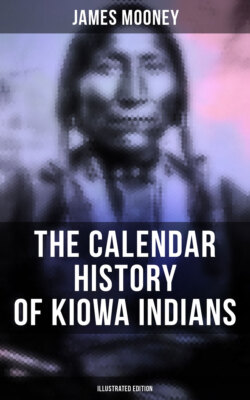Читать книгу The Calendar History of Kiowa Indians (Illustrated Edition) - James Mooney - Страница 38
На сайте Литреса книга снята с продажи.
The Treaty of 1837
ОглавлениеTable of Contents
Owing to a delay in the negotiations, the Kiowa who had attended the meeting became impatient and returned home and consequently were not parties to this treaty, but two years later a full delegation of Kiowa, Apache, and Tawakoni went down to Fort Gibson, where the first treaty between the United States and these tribes was made on May 26, 1837, and was formally ratified the following year. In the document the three tribes are called "the Kioway, Ka-ta-ka, and Ta-wa-karo nations of Indians." The general terms of the treaty are the same as in that previously made with the Comanche and Wichita, namely, peace and friendship, with forgiveness of past injuries, and satisfactory settlement of future disputes that might arise between these western tribes and the Osage, Muscogee (Creek), and citizens of the United States. All the tribes concerned were to have equal hunting rights on the southern prairies as far west as the jurisdiction of the government extended, and citizens of the United States were to have free right of travel to and from Mexico and Texas through the Indian hunting grounds.
There was also a stipulation that if "any of the red people belonging to the nations or tribes of Indians residing south of the Missouri river and west of the states of Missouri and Arkansas, not parties to this treaty," should be found in the country of the Kiowa, they should be kindly treated by them. This was probably intended to refer only to the immigrant tribes removed from the east, as it was hardly to be expected that the Kiowa would act very hospitably toward any stray Dakota or Pawnee who might occasionally visit the Arkansas in search of Kiowa scalps or ponies. There was also a distinct understanding that it was the desire of the government that perfect peace should exist between the Kiowa and their allies and the republics of Mexico and Texas. The usual presents were then distributed and everybody was happy (Treaties).
The peace thus made with the Osage and Creeks was never broken, although in after years relations with the Osage were somewhat strained in consequence of their serving as scouts against the allied southern plains tribes. The promised friendship was also kept with regard to the citizens of the United States until after the annexation of Texas, which the Kiowa and Comanche never ceased to regard as a distinct and hostile government, making a clear distinction between "Americans," i. e., settlers and emigrants from the north or Kansas side, and "Texans," whom they regarded as a different nation and their enemies, in having driven them from their best hunting grounds in violation of treaties and without compensation.
The treaty commissioners on behalf of the government were General Montfort Stokes and A. P. Chouteau, the latter being a member of the noted pioneer trading company. Clermont and Roly McIntosh, head chiefs of the Osage and Creeks, signed, with others, for their respective tribes. Among the witnesses were a number of officers, stationed at Fort Gibson, including, among others, the commanding officer, Colonel Whistler, the noted Captain Bonneville, and Colonel R. L. Dodge, who had led the dragoon expedition. The treaty was signed by ten Kiowa chiefs and principal men, three Apache (whose Kiowa names only are given), and four Tawakoni. Below are given the names of the Kiowa and Apache, as the earliest on record from these tribes, excepting those given by Catlin, together with the proper forms and translations of those which can be identified.
Kiowa
Ta-ka-ta-couche, "Black Bird" (Couche-kóñigya, "black"?). Cha-hon-de-ton, "Flying Squirrel." Ta-ne-congais, "Sea Gull" (?) (T'ené-kóñigyă, "Black Bird"). Bon-congais, "Black Cap" (Bohón-kóñigya, "Black Cap"). To-ho-sa, "Top of the Mountain" (Dohásän, "Little Bluff"). Sen-son-da-cat, "White Bird." Con-a-hen-ka, "Horned Frog" (Séhänk`ia, "Horned Toad Man"?). He-pan-ni-gais, "Night." Ka-him-hi, "Prairie Dog" (Tséñhi ? "Dog"). Pa-con-ta, "My Young Brother."
Apache
Hen-ton-te, "Iron Shoe" (Hâñ-doti, "Iron Shoe, or Moccasin"). A-ei-kenda, "One who is Surrendered." Cet-ma-ni-ta, "Walking Bear" (Set-mänte, "Bear Above? or Walking Bear"?).
At this time the Kiowa were located on the upper waters of Arkansas, Canadian, and Red rivers, in friendship with the Comanche and Wichita, who occupied much of the same territory, but usually ranged more to the east and south. They continued to occupy the same general region until confined to their present reservation. Their war parties extended their raids far beyond these limits, particularly toward the south.
